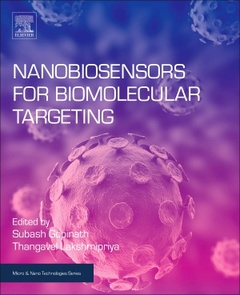Description
Nanobiosensors for Biomolecular Targeting
Micro and Nano Technologies Series
Coordinators: C.B. Gopinath Subash, Lakshmipriya Thangavel
Language: English
Subject for Nanobiosensors for Biomolecular Targeting:
Keywords
<; p>; Nanotechnology; Nanosensing; Diagnosis; Biosensing; Disease Surveillance<; /p>
351 p. · 19x23.3 cm · Paperback
Description
/li>Contents
/li>Readership
/li>Biography
/li>Comment
/li>
Nanobiosensors for Bio-molecular Targeting presents the latest analytical methods for the detection of different substances in the range of small molecules to whole cells, exploring the advantages and disadvantages of each method. Biosensors combine the component of biological origin and physicochemical detector to show the presence of analytes in a given sample. The use of bionanotechnology has led to a significant advancement in the progression of nanobiosensors and has been effectively used for biomedical diagnosis.
Biomaterials Scientists and Bioengineers who want to learn more about how nanosensors can improve rapid disease diagnosis.
Dr. Subash C.B. Gopinath is an Associate Professor at the Centre of Excellence (CoE), Universiti Malaysia Perlis (UniMAP), Malaysia. He obtained his PhD from University of Madras, India, then continued his research at the Academia Sinica, Taiwan, National Institute of Advanced Industrial Science and Technology, Japan, and University of Malaya. His research interests include nanobiosensors, nanotheranostics, non-coding RNA and other related applications of nanomaterials. He has published numerous articles in reputed Journals, such as Acta Biomaterialia, International Journal of Biological Macromolecules, and International Journal of Nanomedicine.
Thangavel Lakshmipriya is based at the Institute of Nanoelectronic Engineering, University of Malaya’. His research focuses on the use of nanomaterials for biomolecular detection for the early diagnosis of desease
- Explains the detection techniques used by nanosensors, exploring the strengths and weaknesses of each for the detection of disease
- Shows how biosensors are used to detect various types of biomolecules
- Demonstrates how the use of nanomaterials makes biosensors both cheaper and more efficient

